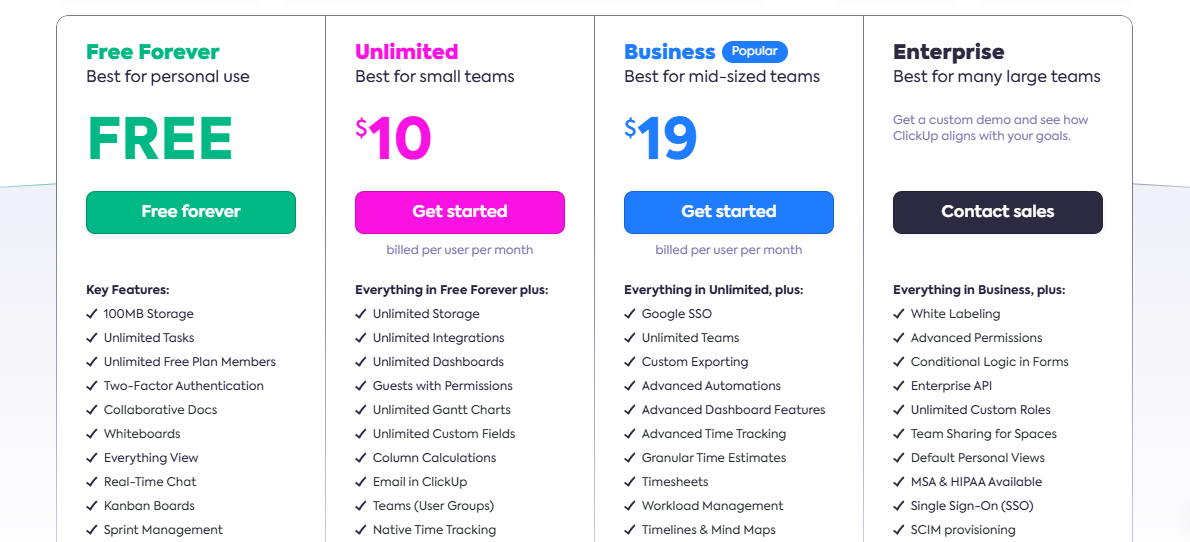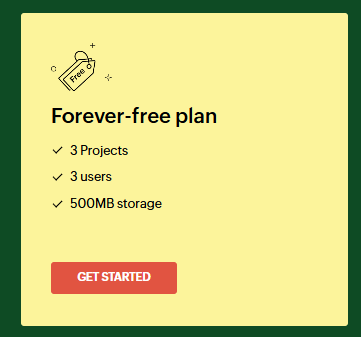Managing projects in today’s fast-paced environment requires flexibility, collaboration, and efficiency. This is where Agile project management tools come into play.
Agile tools are designed to help teams embrace Agile principles and methodology, delivering value incrementally while quickly adapting to changes.
In this article, I’ll share the ten best Agile project management tools, breaking down their key features, pricing, use cases, and more, helping all teams striving for adaptability and productivity find their best fit.
Factors to Consider When Choosing Agile Project Management Tools
Before diving into the tools, it’s important to understand what to look for in your ideal Agile project management solution, as not all platforms are made the same.
Since Agile methodology is a project management approach that emphasizes flexibility, collaboration, and customer-centricity, a good Agile project management tool should support those key values.
Moreover, since the Agile approach aims to deliver value incrementally and iteratively rather than completing the entire project in a single, linear process, your chosen tool should also allow your team to manage projects in comprehensive phases.
Now that we have the Agile essentials clarified, here are key factors to keep in mind:
1. Customization Options
Agile workflows vary widely, from Scrum and Kanban to Lean and SAFe methodologies.
Choose a tool that allows you to tailor boards, templates, and task management systems to fit your team’s processes, preferences, and the type of project you’re looking to manage.
2. Collaboration features
Effective teamwork and communication are central to Agile.
Given its customer-centricity, you should be able to collect, organize, and analyze customer feedback and allow your team to collaborate on projects in real-time.
Look for tools that offer real-time updates, built-in communication features, comprehensive dashboards, and seamless file sharing.
3. Scalability
As your team or organization grows, your tool should be able to handle more complex projects and larger teams without breaking the bank.
Focus on tools with transparent pricing that offer a solid number of essential Agile project management features in all - or at least most of - its plans for greater flexibility.
4. Integration
The ability to integrate with the tools your team already uses is crucial for streamlining workflows.
Key integrations to look for include those with version control systems (e.g., GitHub), communication apps (e.g., Slack), and CRM platforms.
5. Ease of use
Finally, you don't want a tool that takes ages to figure out and requires extensive training for your team.
Project management teams prefer tools that are intuitive and quick to learn to avoid disrupting their workflow.
What Are the Best Agile Project Management Tools in 2026?
1. SmartSuite: All-in-one project management tool with a wide range of flexible and customizable features, perfect for teams across industries and use cases.
2. Jira: Best for software development and handling highly complex Agile projects.
3. Trello: User-friendly visual project management.
4. Asana: Excels at managing complex, multi-step projects.
5. Monday.com: Lets you build highly customizable workflows for various purposes.
6. ClickUp: Feature-rich project management solution for centralizing projects, knowledge, and conversations.
7. Zoho Sprints: Project management tool that’s part of the Zoho ecosystem, perfect for Zoho users.
8. Microsoft Azure DevOps: Enterprise-level software development.
9. Rally: Best suited for enterprise-level Agile frameworks.
10. Taiga: Open-source project management.
1. SmartSuite
SmartSuite (that’s us) is a comprehensive work and project management platform with a wide range of highly customizable features, making it the best agile project management tool.

Disclaimer: Even though SmartSuite is our project management software, we’ll aim to give you an unbiased perspective into why it is the best agile project management solution in 2026.
Due to its flexibility, SmartSuite easily fits into both Agile and non-Agile frameworks. Thus, it can be used to manage all kinds of projects while applying any framework and methodology you may need.
Let’s dive into some of SmartSuite’s features critical for supporting Agile frameworks.
Feature #1: Comprehensive project management & resource allocation
SmartSuite has a wide range of project management tools that support the Agile framework, allowing your team to:
- Break projects into smaller phases.
- Allocate resources optimally.
- Gain better visibility into each project’s progress.
Some of these tools include the following:
- Versatile dashboards: SmartSuite's intuitive dashboard builder and widgets make it easy to create any kind of dashboard. For example, you can create product roadmaps, release plans, SCRUM boards, and even reporting dashboards to visualize and track project progress.

- Customizable views: SmartSuite lets you view your data and records in any way your team needs, ranging from simple grid and calendar views to Kanban boards and Gantt charts for multiple timeline management and organization. This way, you can visually track progress, goal completion, deadlines, task status and priority, and more.

- Comprehensive resource allocation: You can do anything from tracking time and budgets to assigning tasks and monitoring their completion and beyond.
- Workflow automation: You can automate all kinds of workflows and tasks, ranging from capturing customer feedback to tracking bugs, and more.
Feature #2: Templates for Agile-specific workflows
SmartSuite offers a rich library of customizable templates for various project types, use cases, and management frameworks, including Agile.
Thanks to these, you can easily set up essential Agile project management workflows in a fraction of the time it would take to do it from scratch.
Some of Agile team’s favorite templates include:
- Customer feedback: This lets you collect and consolidate customer feedback across sources to get a centralized source of truth. You can view and filter based on various factors, such as feedback language, feature, product, sentiment, etc.

- Feature prioritization: Easily prioritize the features your customers want most so you can focus on developing and releasing them first.
- Competitor analysis: This helps you keep an eye on your competitors, analyze their pros and cons, and identify potential opportunities for your growth.

- SCRUM tables: Perfect for teams that want to apply this Agile methodology, this template lets you set up sprints, roadmaps, bug lists, and more to get a better overview of your project's progress.
- Product roadmap: This customizable template helps your team easily design a roadmap that best fits your product, business goals, and team preferences.

Feature #3: Real-time collaboration
Collaboration and teamwork are two critical components of the Agile methodology, as being able to work together on projects is essential for managing projects iteratively.
SmartSuite has several powerful collaboration features that ensure everyone in your team is kept in the loop at all times:
- Communication center: This feature lets you talk to team members within the platform, right next to a specific project. You can also attach important files, share links, and more, keeping a constant flow of ideas and boosting efficiency across levels.
- Mentions: Use @mentions to easily get the co-worker you need to look at a particular task or project segment.

- Real-time updates: This allows multiple team members to view, edit, and work on shared projects without overlapping or delays. Every action taken in a project is immediately visible to the rest of the team, ensuring that everyone is always working on the latest version.

- Member Directory: This lets you connect with team members, see who’s online, check out their interests and skills, and reach out no matter where they’re working.
- SmartDocs: This feature allows you to work on creating and editing dynamic text documents similar to those available in Google Docs, Notion, and Coda. It’s perfect for collaborative editing, brainstorming on product plans, and more.
- Mobile app for iOS and Android: This is especially useful for remote, hybrid, or multi-locational teams, ensuring that everyone can access and edit projects and reply to comments and inquiries at all times.
Pricing
SmartSuite has a free forever plan for teams that are just getting started.
It lets you onboard up to three users and provides access to all of the platform’s essential features, including templates, all views and reporting features (except for Gantt Charts), team collaboration, and more.
If you need more users, storage, and a few extra features, there are four paid plans to choose from:
- Team: $10/user per month, includes everything in Free, plus unlimited users and projects, Gantt charts, AI features, etc.
- Professional: $25/user per month, includes everything in Team, and adds more automation runs, advanced roles and permissions, and more.
- Enterprise: $35/user per month, includes everything in Professional, plus more advanced security.
- Signature: A customized plan tailored to your organization’s needs and team size with no predefined limits.

If you want to try SmartSuite before subscribing, there’s a 14-day free trial.
Pros & Cons
✅ Generous freemium.
✅ Real-time collaboration on all plans.
✅ Wide range of Agile-specific templates.
✅ Intuitive interface that requires minimal to no training for most workflows.
✅ Versatile task management and automation functionality.
✅ Comprehensive dashboards and reports for tracking projects in real-time.
✅ Highly customizable, supports both Agile and non-Agile frameworks.
❌ Fewer native integrations compared to platforms that have been on the market longer.
2. Jira
Best for: Software development.

Jira is a well-known powerhouse for Agile teams, offering customizable workflows, robust Scrum and Kanban boards, and deep integration with development tools.
Its rich reporting capabilities make it ideal for tracking complex projects.
Who is it for?
Jira is perfect for software development teams that need robust customization and deep integrations.
Top Features

- Comprehensive Scrum and Kanban boards.
- Visual roadmaps for planning project milestones.
- Powerful reporting tools like burndown charts and velocity reports.
Pricing
Jira has a free forever plan for up to 10 users.
It offers unlimited projects, goals, tasks, and forms, reports and dashboards, up to 100 automations per month, and more.
Bigger teams can subscribe to one of three paid plans:
- Standard: $8.60/user/mo, includes everything in Free, plus user roles and permissions, more automations, etc.
- Premium: $17/user/mo, everything in Standard, plus AI features, more customization options, and automations.
- Enterprise: Custom pricing, everything in Premium, plus more advanced security and custom automation rules.

Note: The more team members you onboard, the lower the per-user price.
Pros & Cons
✅ Highly customizable.
✅ Lots of native integrations with development tools.
✅ Wide range of features designed to support the Agile framework (Kanban and Scrum boards, comprehensive task management, etc.).
❌ Steep learning curve, especially for beginners in the space.
❌ Unintuitive workflows.
3. Trello
Best for: Simple and visual task management.

Trello is a project management platform known for its intuitive Kanban boards and drag-and-drop functionality.
With features like automation and easy collaboration, Trello keeps task management simple and effective, making it the perfect choice for small teams or startups.
Who is it for?
Small teams or startups looking for an easy-to-use tool with minimal setup.
Top Features

- Intuitive Kanban boards for tracking tasks visually.
- Lets you automate repetitive tasks via its Butler automation assistant.
- Collaboration tools, including comments, checklists, and file sharing.
Pricing
Trello has a free version of its project management platform that includes automation features and up to 10 seats.
If you need more, you can choose from three paid plans:
- Standard: Starts from $5 per user/month and adds unlimited activity log and 250 workspace command runs/month.
- Premium: Starts from $10 per user/month and adds unlimited workspace collaborators and built-in automation.
- Enterprise: Starts from $17.50 per user/month for 50 users and includes 24/7 enterprise admin support and SAML SSO via Atlassian Access.

If you want to try it before subscribing, Trello offers a 14-day free trial.
Note: On the Enterprise plan, you get a per-seat discount the more users you bring to the platform.
Pros & Cons
✅ User-friendly interface.
✅ Lots of versatile project board templates to help you get started.
✅ Wide range of native integrations and plugins to keep your tool stack connected.
❌ Not suitable for more complex projects.
❌ Limited mobile functionality.
4. Asana
Best for: Complex project management.

Asana is a project management platform that excels at handling intricate workflows thanks to tools such as timeline views, automation rules, and custom fields.
However, its numerous features and learning curve can make it intimidating for smaller teams.
Who is it for?
Teams handling large projects with multiple stakeholders and detailed workflows.
Top Features

- Timeline views for tracking dependencies and deadlines across projects and tasks.
- Automation rules to streamline workflows.
- Custom fields for tracking unique project metrics.
Pricing
Asana has a free plan designed for individuals and small teams of up to 10 members, including unlimited tasks, projects, messages, and more.
However, if you want access to its AI and other advanced features, you’ll have to upgrade to one of four paid tiers:
- Starter: $10.99/user/mo, everything in the Free plan plus up to 500 team members, Asana AI, automations, etc.
- Advanced: $24.99/user/mo, everything in Starter, plus more automations, time tracking, advanced analytics, etc.
- Enterprise: Custom pricing, no seat limits, more advanced integrations for cross-department work.
- Enterprise+: Custom pricing, and more advanced security, built for enterprise businesses that need to meet strict compliance requirements.


Pros & Cons
✅ Integration with over 200 apps, including Slack and Salesforce.
✅ Robust security.
✅ Highly customizable, meaning it can accommodate various work styles and needs, both Agile and non-Agile.
❌ Learning curve.
❌ Collaboration features don’t work as seamlessly as they should.
5. Monday
Best for: Creating personalized project management workflows.

Monday stands out for its flexibility, offering drag-and-drop workflow customization, visual dashboards, and robust automation.
This makes it ideal for teams that want to adopt the Agile methodology and tailor it to their unique project management processes and needs.
Who is it for?
Teams looking for flexibility in tailoring their project management processes.
Top Features

- Drag-and-drop interface for creating custom workflows.
- Comprehensive time management tools.
- Visual dashboards for tracking progress.
Pricing
Monday has a free plan for up to 2 users with up to 3 boards, unlimited docs, 200+ custom templates, etc.
For more features, there are 4 paid plans to choose from:
- Basic: €12 seat/month, includes unlimited free viewers, unlimited items, 5GB file storage, etc.
- Standard: €14 seat/month, everything in Basic, the first plan to include automations.
- Pro: €24 seat/month, private boards, Chart View, etc.
- Enterprise: Custom pricing, built for enterprise-grade businesses.

Pros & Cons
✅ Lets you set up custom roles and permissions to ensure that certain projects or tasks are visible and editable only by appropriate team members.
✅ Plenty of customization options regarding project boards and views.
✅ Powerful automation features.
❌ Automations are available only on the Standard plan and above.
❌ Learning curve.
6. ClickUp
Best for: Handling large projects from a unified platform.

ClickUp is a project and work management solution that provides a comprehensive suite of tools suitable for applying the Agile framework, including Kanban boards, Gantt charts, time tracking, and customizable templates.
It’s a great option for teams wanting to centralize all their project management needs.
Who is it for?
Teams that want a comprehensive tool to centralize tasks, docs, and timelines.
Top Features

- Multiple views, including Kanban, Gantt charts, timelines, and more, all important for Agile project management.
- Versatile time tracking and workload management options.
- Powerful analytics dashboards let you visualize and track sprints, product development phases, and other relevant processes.
Pricing
ClickUp offers a free plan that includes unlimited task creation, access to 100 MB storage, and collaborative docs.
You can upgrade to one of three plans for more features:

- Unlimited: Starts at $10 per user/month, which includes access to unlimited custom views, timesheets, guest access, and 100 mind map creation.
- Business: Starts at $19 per user/month and adds private docs, sprint reporting, and all dashboard views.
- Enterprise: Custom price that adds white labeling, enterprise-grade security, and AI features.
There’s also a 14-day free trial.
Pros & Cons
✅ Easy task tracking with lots of granular details for a complete overview.
✅ Flexible and customizable.
✅ Unlimited storage on all paid plans.
❌ Steep learning curve due to an overwhelming number of features and lack of comprehensive documentation.
❌ Buggy interface.
7. Zoho Sprints
Best for: Providing a deep integration with the entire Zoho suite.

Zoho Sprints is an agile project management platform that combines simplicity with functionality, offering Scrum boards, time tracking, and analytics.
Its competitive pricing makes it a favorite among teams on a budget.
Who is it for?
Small and medium-sized Agile teams that use other Zoho products and want to create an integrated project management environment.
Top Features

- Comprehensive scrum boards for sprint planning.
- Visual time tracking for monitoring progress.
- OKR (Objectives and key results) is a goal-setting framework which you can use to set a clear and measurable vision, along with key results, to align your team around a common goal.
Pricing
Zoho Sprints has a free forever plan for up to 3 users that includes 3 projects and 500MB of storage.

When it comes to its paid options, there are three to choose from:
- Starter: €1/user/month, annual billing only, starts at 12 and includes up to 100 users, 50 projects, 5 project templates, Scrum boards, Epic management, etc.
- Elite: €3/user/month when billed monthly, everything in Starter, plus unlimited users and projects, custom permissions, client portal, etc.
- Premier: €6/user/month, everything in Elite, plus release management, advanced timesheet settings, custom mail templates, etc.

Zoho Sprint’s Premier plan has a 15-day free trial if you want to test its most advanced features.
Pros & Cons
✅ Affordable.
✅ Robust reporting and analytics for tracking project progress and team performance in real-time.
✅ Seamless integrations with other Zoho products.
❌ Steep learning curve.
❌ Unintuitive interface.
8. Microsoft Azure DevOps
Best for: Enterprise-level software development.

Azure DevOps isn’t exactly a project management platform as such, but it is one of the best Agile solutions overall, which is why it made it to this list.
Azure DevOps is a software development tool that can be used for software development and project management due to its powerful, Agile-oriented capabilities.
Because of its deep integration with the Microsoft ecosystem, Azure DevOps is a good choice for large organizations that primarily rely on Micorosft’s suite and need powerful development and collaboration tools.
Who is it for?
Enterprises with complex development and management workflows.
Top Features

- Azure pipelines provide integration with CI/CD (Continuous Integration/Continuous Delivery) pipelines, supporting an iterative approach to developing products.
- Agile planning tools, including Kanban boards, interactive backlogs, and powerful Scrum boards.
- Azure Repos provide unlimited, cloud-hosted private Git repos that let you collaborate to build better code with pull requests and advanced file management.
Pricing
Azure DevOps has separate pricing for complete user licenses and individual services.
When it comes to the licenses, there are two to choose between:
- Basic Plan: First 5 users free, then $6 per user per month, includes Pipelines, Boards, Repos, and Artifacts.
- Basic + Test Plans: $52 per user per month, includes all Basic plan features, plus test planning, tracking & execution, and more.

If you’re interested in getting just an individual service, you can go for:
- Azure Pipelines, includes 1 Microsoft-hosted job with 1,800 minutes per month for CI/CD and 1 self-hosted job with unlimited minutes per month and is charged $40 per extra Microsoft-hosted CI/CD parallel job and $15 per extra self-hosted CI/CD parallel job with unlimited minutes.
- Azure Artifacts, includes 2 GiB free, then starting at $2 per GiB.
- GitHub Advanced Security for Azure DevOps, $49 per committer per month.

Pros & Cons
✅ Deep integration with Microsoft’s product suite.
✅ Comprehensive Agile features.
✅ Plenty of customization options.
❌ Requires extensive coding knowledge.
❌ Steep learning curve.
9. Rally
Best for: Managing large-scale projects in comprehensive Agile workflows.

Rally (formerly CA Agile Central) is a designated Agile project management platform that provides advanced portfolio management and analytics tools, making it suitable for large teams managing high-level initiatives.
Its focus on enterprise Agile processes ensures scalability and efficiency across teams and departments.
Who is it for?
Large organizations practising Agile at scale, focusing on high-level planning and team alignment.
Top Features

- Detailed reporting and analytics.
- Portfolio management offers advanced tools to align team-level work with broader business objectives and initiatives.
- Dependency tracking helps teams manage and visualize dependencies across multiple projects.
Pricing
Rally’s pricing is not publicly disclosed.
For more details, it’s best to contact its sales team.

Pros & Cons
✅ Optimized for handling large Agile workflows.
✅ Advanced report filters let you easily narrow down the exact metrics you need.
✅ Retrospective and feedback loop features allow teams to reflect on their sprint-by-sprint progress and make necessary adjustments on the go.
❌ Unintuitive user interface.
❌ Issues with managing and organizing user stories.
10. Taiga
Best for: Open-source project management.

Taiga is a budget-friendly Agile tool that supports Scrum and Kanban workflows, among other Agile-relevant features.
Its open-source nature makes it highly customizable and ideal for tech-savvy teams.
Who is it for?
Teams seeking an affordable, open-source Agile tool with numerous customization options.
Top Features

- Support for Scrum and Kanban workflows.
- Backlog management for prioritizing tasks.
- Integrated and complete issues/bug tracking.
Pricing
Taiga has different pricing options depending on whether you’re interested in its cloud version, self-hosting, or on-premise deployment.
If you choose cloud deployment, there are two options:
- Taiga Cloud Basic: Free forever, includes an unlimited number of users and projects, estimation tool Taiga Seed, and community support.
- Taiga Cloud with Premium support: $70/mo, everything in Basic, plus premium support.

Should you decide to self-host, Taiga will once again be free of charge and include everything you get in the Cloud Basic package.
Finally, if you want to deploy it on your premises, Taiga has a plan typically suitable for teams of at least 25 people, that includes Everything from Self-Hosted and priority support with SLA, installation support, scheduled updates, and more.

Pros & Cons
✅ Has several free plans.
✅ Simple interface.
✅ Very flexible.
❌ Its reporting and analytics aren’t as granular as with some other platforms on the list.
❌ No mobile apps.
Looking to Take your Agile Projects to the Next Level?
While every tool on this list can enhance your team’s efficiency, productivity, and collaboration, SmartSuite stands out as the best choice if you’re looking for a comprehensive solution to empower Agile workflows.
Whether you’re managing sprints, tracking dependencies, or ensuring effective team communication, SmartSuite offers an all-in-one platform to keep your Agile projects on track and deliver results efficiently.
Explore SmartSuite’s free plan and discover how it can revolutionize your team’s workflow and productivity!

Run your entire business on a single platform and stop paying for dozens of apps
- Manage Your Workflows on a Single Platform
- Empower Team Collaboration
- Trusted by 5,000+ Businesses Worldwide















